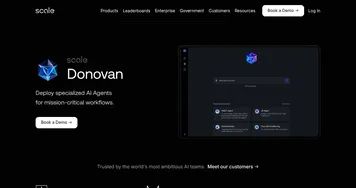Vespa

Vespa is a powerful, open-source platform for real-time AI-driven search, recommendation, and data processing, designed for enterprise-scale applications. It combines vector search, lexical search, and structured data queries, enabling complex, low-latency operations across billions of data items. Supporting thousands of queries per second with sub-100ms response times, Vespa powers applications for companies like Spotify, Yahoo, and Wix. Its core strength lies in its ability to integrate machine-learned ranking and tensor operations directly into the data layer, ensuring high relevance and performance.
The platform’s Hybrid Search feature allows simultaneous querying of vectors, text, and structured data, making it ideal for use cases like e-commerce search or personalized recommendations. Vespa’s Tensor Operations support complex ranking models, such as ONNX or XGBoost, executed where data resides to minimize latency. Streaming Search mode optimizes cost for personal data applications by bypassing traditional indexing. The platform scales linearly, automatically distributing data across clusters, and supports real-time updates without downtime. Vespa is available as an open-source solution under Apache 2.0 or as a managed service via Vespa Cloud.
Compared to competitors like Elasticsearch and Milvus, Vespa excels in AI-driven tasks with its tensor framework and real-time inference. Elasticsearch offers robust aggregation but lacks Vespa’s native tensor support, while Milvus focuses on vector search but doesn’t match Vespa’s hybrid capabilities. Vespa’s open-source model is cost-effective, though its managed cloud service likely aligns with industry-standard pricing for enterprise solutions.
Drawbacks include a steep learning curve for configuring clusters and schemas, which may challenge teams without search expertise. Documentation, while comprehensive, can be hard to navigate for beginners. High query volumes may require significant compute resources, potentially increasing costs for large-scale deployments. Vespa’s community, while active, is smaller than Elasticsearch’s, which may limit peer support.
To get started, deploy a sample application using Vespa’s Docker-based guide. Focus on the Hybrid Search and Ranking documentation to leverage its AI capabilities. Join the GitHub community for updates and troubleshooting. For enterprise use, evaluate Vespa Cloud to simplify management.
Video Overview ▶️
What are the key features? ⭐
- Hybrid Search: Combines vector, text, and structured data queries in one operation for high relevance.
- Tensor Operations: Supports complex ranking and inference with native tensor support for models like ONNX.
- Streaming Search: Optimizes cost for personal data searches by avoiding traditional indexing.
- Scalability: Automatically distributes data across clusters for linear scaling with no downtime.
- Real-Time Updates: Handles continuous data changes while maintaining query performance.
Who is it for? 🤔
Examples of what you can use it for 💭
- E-commerce Developer: Builds a search system combining product descriptions, images, and structured data for fast, relevant results.
- Data Scientist: Deploys machine-learned models for real-time recommendation systems with high query throughput.
- Media Company Engineer: Powers personalized content delivery across millions of users with sub-100ms latency.
- Financial Analyst: Searches billions of documents instantly using hybrid queries for fraud detection.
- AI Researcher: Implements RAG systems with multi-vector embeddings for enhanced contextual search.
Pros & Cons ⚖️
- Fast query speeds under 100ms
- Scales to billions of data items
- Supports hybrid search types
- Steep learning curve
- Complex setup process
FAQs 💬
Related tools ↙️
-
 Merge for AI
AI tool that allows anyone to contribute to Merge's Unified APIs and accelerate integration development
Merge for AI
AI tool that allows anyone to contribute to Merge's Unified APIs and accelerate integration development
-
 Sonar
Delivers real-time, AI-powered search with citations for accurate answers
Sonar
Delivers real-time, AI-powered search with citations for accurate answers
-
 Scale Donovan
Enables public sector teams to build, customize, evaluate, and deploy specialized AI agents
Scale Donovan
Enables public sector teams to build, customize, evaluate, and deploy specialized AI agents
-
 Gumloop
A no-code platform that empowers users to automate workflows using AI
Gumloop
A no-code platform that empowers users to automate workflows using AI
-
 Clarity AI
Analyze sustainability data with AI for investment and regulatory insights
Clarity AI
Analyze sustainability data with AI for investment and regulatory insights
-
 1up
Automates RFPs and questionnaires for sales teams in minutes
1up
Automates RFPs and questionnaires for sales teams in minutes

